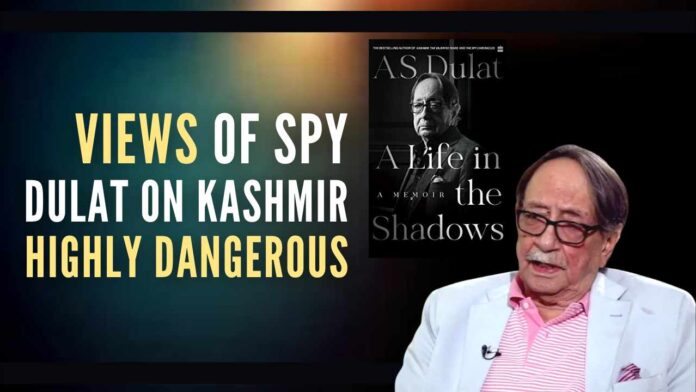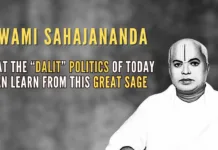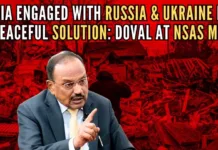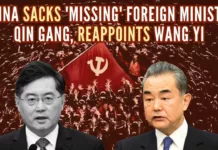
Ex-spy chief A S Dulat come out with his new memoir
Former RAW chief Amar Singh Dulat, who also served in the erstwhile J&K State, along with National Security Advisor Ajit Doval, has come out with his new memoir, “A Life in the Shadows”. One of the chapters in the book is on “Kashmir and Kashmiriyat”. Journalist Karan Thapar was so moved, so influenced and so impressed by the book that he, on December 20, interviewed Dulat (The Wire)[1]. Thapar on occasion put his own words, formulations, and narratives on Kashmir and Kashmiriyat in the Dulat’s mouth. Significantly, Dulat didn’t disagree even once. On the contrary, Dulat in certain cases left Thapar far behind and made certain remarks that Thapar (perhaps) had not expected. Indeed, Dulat’s answers/ remarks/ responses enthralled Thapar.
One thing that was common between Dulat and Thapar was that none uttered a word on the aspirations, needs, compulsions, and woes of the people of Jammu and Ladakh in the erstwhile State of J&K. It was more than evident from the questions Thapar asked and answers Dulat gave that they considered Kashmir and people of Kashmir belonging to one particular community as the sole factors in the political situation of the erstwhile state before 2019 and continue to consider them the only factor in the J&K UT after 2019. To be more exact, the interview suggested that Jammu was/ is not a factor and the people of Jammu province are no more than subjects of Kashmir, and that if the situation in Kashmir is to be retrieved, the Narendra Modi government has to appreciate the sentiments of the now out-of-power Kashmiri leaders as well as the “sensitive” majority community. Like other secular think tanks, Kashmir experts, and troubleshooters, they sought to create an impression that meeting the aspirations and urges of Kashmir’s majority community would be like fulfilling the aspirations and urges of all in J&K UT.
The point I am trying to make is that both Thapar and Dulat talked very seriously about Kashmir’s majority community and its leaders, their apprehensions and aspirations, their sentiments and sensitivities, their attitude towards New Delhi in general, and the Narendra Modi government in particular and vice-versa, their stand on Indo-Pak relations, their view on the Union Home Minister Amit Shah’s stand on talks with Pakistan vis-à-vis talks with the youth of J&K, what they think about all other Indians and what other Indians think about the majority community and so on.
What, according to Dulat, turned Kashmiris “devious” and take recourse to lies, caused alienation in Kashmir, created disorder and trust deficit between the Kashmiri leadership/ majority community and New Delhi, disturbed the political equilibrium in the Valley and prompted Pakistan to interfere in J&K? The dismissal and arrest of Sheikh Abdullah in 1953 and the dismissal of Farooq Abdullah government in 1984 were the biggest blunders, Dulat opined. If action against Sheikh Abdullah led to the death of democracy in Kashmir for all the times to come, action against Farooq Abdullah, and not really the rigging of the 1987 Assembly elections, provided an opportunity for Pakistan to interfere in J&K, Dulat suggested.
“I think they (majority community of Kashmir) have good reason to feel betrayed…It goes back to Sheikh Abdullah’s arrest in August 1953, and, you know, there was a foreign secretary, the last one that Jawaharlal Nehru had, who continued as foreign secretary in Shastri’s time, Y D Gundevia. In his memoir, I think it’s called Outside the Archives, Gundevia says, ‘Democracy died the day Sheikh was arrested. Democracy in Kashmir died the day Sheikh was arrested…And another person B N Mullik in his book on Kashmir, you know, wrote three books on the Nehru years. He says when he went to Madras after the Sheikh’s arrest and he met Rajaji – C Rajagopalachari (second Governor-General of independent India). Rajaji said to him, ‘Why did we need to slam the door on the Sheikh? Now you’ll never have peace in Kashmir…But there is one other watershed moment or point I’d like to make here, and that is the dismissal of Farooq Abdullah in 1984. I think that was another disaster. And when I talk about 1984, I think in some ways it also led to 1988, 1989. Everybody talks about the rigging in the 1987 elections, but I think it was Farooq’s dismissal which also began to encourage Pakistan that now was the right time to interfere in Kashmir,” Dulat told Thapar.
But Dulat didn’t stop here. To make his point about why the Kashmiris turned “devious” and why they “lie”, Dulat, inter-alia, said: “The Kashmiri has learned over the years to be devious. It is for them the key to survival. They will not trust you easily. They will not trust each other at all…They don’t trust you (in this case Government of India) easily and the Mirwaiz explained this to me once, you know. He said, ‘You say we lie, and we do lie. But who taught us how to lie? Because you never speak the truth to us. Therefore, I mean it comes naturally. There is a deviousness in the Kashmiri and you can’t make out the Kashmiri”.
What does all this suggest? It only suggests that the Sheikh, Farooq Abdullah, the Mirwaiz, and the Kashmir majority community were right and innocent and New Delhi was wrong and dishonest. Let me quote what he thinks about in this regard. He said: “The local Kashmiri has always had mixed feelings, coated with distrust, about Delhi. Time and again, Delhi has misunderstood, not followed through on promises, or simply let them down. Time and again, the Kashmiri has been left betrayed”. Which promises? Greater autonomy or semi-independence or self-rule or Indo-Pak joint control or unbridled legislative, judicial, and executive powers, Dulat remained mum.
As for the Narendra Modi government and HM Amit Shah, Dulat called them insensitive. “Sensitivity is missing today. Unfortunately, it is missing and the Kashmiri still remembers Vajpayee’s ‘insaaniyat, Kashmiriyat, and jamuriyat’, and he keeps repeating that. But it is the same party, but (now) it’s of a different time and a different view as well,” Dulat said while endorsing Thapar’s view: “that’s the big difference between Vajpayee and Modi”.
As said, Dulat blamed the Modi government and HM Shah for the prevailing situation in Kashmir or for the trust deficit between the majority community of Kashmir and their leaders and New Delhi. He blamed the Modi government because it abrogated Article 370 and Article 35A and divided J&K into two UTs in August 2019. He blamed HM Shah because he, unlike “Shinde Sahab” (HM in the Congress-led UPA government) goes and says in Kashmir” that he won’t talk to Pakistan.
In this regard, Dulat further said: “What Mr. Amit Shah says in Kashmir is not as welcome as what Shinde Sahab used to say. Well, he (Shah) said we are willing to talk to the Kashmiri youth, but we won’t talk to Pakistan. Now that doesn’t go down well in Kashmir. What is the need to say that? Like the Kashmiris would once say that ‘If we are prepared,’ I’m talking about the separatists, ‘If we are prepared to talk to Delhi why rub it in that it must be within the Constitution? If your Deputy Prime Minister or the Home Minister of India is talking to us, obviously it is going to be within the Constitution. Why do you, why do you want to rub these things into us?’ So why go to Srinagar, say it in Delhi, that we don’t want to talk to Pakistan, we won’t talk to Pakistan”.
Dulat also spoke on what the majority community right now wants and its view on Kashmir’s demography targeted killings of Kashmiri Hindus, “Kashmiriyat” and the nature of relations between Kashmiri Muslims and Kashmiri Hindus. He, among other things, said: “The Kashmiri now feels, or particularly, since 2019 and what’s been happening there, that there is no expectation left from Delhi, and it’s a sad story. It’s a very sad story. He (Kashmiri) craves peace, he wants peace, he wants out, and his real fear is that gradually, one day, Kashmiri might be reduced to a minority in his own land, in his own country. That’s the way he perceives it and we do from time to time, unfortunately, add fuel to the fire by talking of demographic changes…Why does it? It was the same way. Why remove 370? There was nothing in 370. And incidentally bringing about a demographic change is not so easy where you have 95% of the population or 98% now is Muslim. How will you change it?… These killings which are happening now sir, these killings which are happening. These targeted killings which happen from time to time are out of that same fear of demographic change”. And when Thapar asserted that “this fear is one that is stoked by the Modi government’s talk of demographic change” and “the Modi government’s talk about giving votes to people who are not permanent residents of the Valley”, Dulat said: “That’s right. That is what I’m saying. That’s right”.
“I’ll tell you (Thapar) what is happening and how it has happened, because, in the Kashmiri mind, there is no expectation left. We are finished. The India that we knew doesn’t exist. In fact, when 2019 also happened one of the questions that the Kashmiris asked, they said, ‘We’ve always had problems with Delhi, but why have the people of India turned against us?’ This is new. So in that way, the same way, we are defeating the idea of India and that is why Mehbooba says from time to time that there’ll be nobody left to hoist the national flag…It’s no longer a dream of Azadi, no longer even a dream to go to Pakistan. It is the nightmare of being reduced to a minority in their own land,” Dulat further told his interviewer.
As for “Kashmiriyat”, Dulat said: “There is constant stonewalling and backtracking, which has led to a change in Kashmiriyat on the ground”. When asked “what is the change in Kashmiriyat that happened?,” Dulat said that “it is a change for the worse…The change is that the Kashmiri Pandit doesn’t feel as secure (now) as he used to be…” It’s obvious that both Dulat and Thapar willfully suppressed the truth – under what circumstances seven Hindu migrations from Kashmir, including the wholesale migration of Hindus, Dogras and Punjabis in January 1990, took place in Kashmir after 1339.
What does all this show? It shows that the whole approach of spy Dulat to J&K is highly dangerous. It also shows that they suppressed the fact that Sheikh Abdullah was dethroned because he was conspiring against India to create an independent Kashmir and Farooq Abdullah’s government was dismissed on the ground that it had become a “threat to national security”. It also shows that Dulat has no place in his scheme of things for the suffering Hindus of Jammu province and the persecuted and internally-displaced Kashmiri Hindus and for the paramount national interests in J&K. It also shows that he and Thapar suppressed the fact that the term “Kashmiriyat” was coined by Jammu-based journalist and Sheikh Abdullah’s close associate, late Balraj Puri, in 1976 and that it was Kashmiriyat which converted Kashmir hundred percent and made it Hindu/ Dogra/ Punjabi-free. It also suggests that he suppressed the fact that Sheikh Abdullah and others who succeeded him consistently subverted democracy by rigging the assembly elections and that it was the 1987 rigging of assembly elections by Farooq Abdullah and PM Rajiv Gandhi and their insatiable lust for power that changed the whole political scenario in Kashmir and put Kashmiri Muslims on the road to permanent separatism. They also didn’t say that it was Kashmiri leaders, who misruled J&K between 1947 and June 2018, with successive governments at the Centre always at their beck and call. It’s unfortunate.
What Dulat actually did as RAW chief and what kind of role did he play while holding other sensitive positions? It warrants a high-level probe.
Reference:
[1] Watch: NSA Ajit Doval is Ambitious, Very Good at Sniffing Power and Being on the Right Side of it—AS Dulat – Dec 20, 2022, The Wire
Note:
1. Text in Blue points to additional data on the topic.
2. The views expressed here are those of the author and do not necessarily represent or reflect the views of PGurus.
PGurus is now on Telegram. Click here to join our channel and stay updated with all the latest news and views
For all the latest updates, download PGurus App.
- ‘Kashmir My core constituency’: Revisiting July 12, 2003 to understand politics, Omar Abdullah-style - March 15, 2024
- Total deviation from traditional approach: Seven takeaways from PM Modi’s March 7 Srinagar visit - March 9, 2024
- Status of political parties: Why is further J&K reorganization imperative? - March 1, 2024











One thing is admitted by both during the interview that Kashmir handling was a series of screw-ups from day one. The ex-spy chief sounds more like a broker for the Abdullas, Muftis and all other undesirable elements. By dragging in NDA 1, they are trying to convey that even BJP was part of the screw up. NDA 1 was formed on the CMP without certain issues which included Kashmir and the PM then put to use his skills of oratory to dampen the situation.